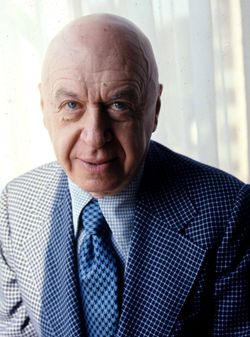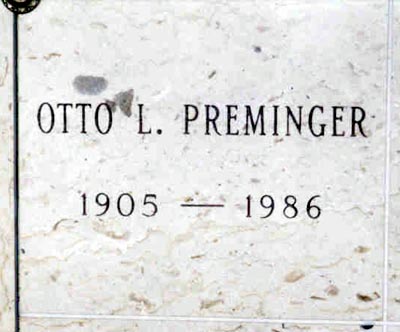Motion Picture Director, Producer, Actor. He is best remembered as the producer of the movie "Exodus" (1960) and for his acting role of the second 'Mr. Freeze' on the "Batman" 1960s television series. As a director, he was noted for his ability to film movies on time, on schedule and on budget. Born Otto Ludwig Preminger in Wiznitz, Austria-Hungary to Markus and Josefa Preminger, his father was a District Attorney for the Austrian-Hungarian Empire. In 1914, with the outbreak of the First World War, the family moved from Wiznitz, which was close to the Russian border, to Graz, in Austria, where Markus Preminger became a public prosecutor. After a year in Graz, Markus was promoted to the equivalent of Attorney General of all of Austria, and the family moved to Vienna. There young Otto developed his love of the stage. He began by memorizing classical monologues from various plays and reciting them to anyone who would listen. He would often slip away from school, to attend theater plays, concerts and other cultural activities. As the war ended, young Otto began to contemplate a theatrical career, and in 1921 at the age of 16, he won the role of Lysander in a production of "A Midsummer Night's Dream." Two years later, he auditioned to Max Reinhardt, a wealthy and famous German director. Reinhardt would become Preminger's mentor and help in learning the craft of acting. To appease his father and to win his approval, Otto completed the study of law at the University of Vienna, but continued to learn acting on the side as Reinhardt's apprentice. Reinhardt had some doubts about Preminger's acting ability, but quickly recognized his talents for administration. Over the next several years, Preminger directed a number of stage shows, and in 1930, he produced his first movie, "Die Grosse Liebe" (The Great Lover). On April 3, 1932, he married Hungarian Marion Mill, just thirty minutes after her divorce from her first husband. In April 1935, Preminger accepted an offer from Darryl F. Zanuck to work as a director for the newly formed studio, Twentieth Century Fox, and soon moved to Hollywood. His first two films for Zanuck proved on time and below budget, so Zanuck gave him "Kidnapped" (1937) to film, which Zanuck had written the screenplay for. After constant fighting between Zanuck and Preminger as to how to film the movie, Zanuck fired Preminger, and Preminger returned to his first roots, the stage, acting in several Broadway shows. After his third Broadway show, Preminger was offered a teaching position at the Yale School of Drama, which he accepted. In 1942, he returned to Twentieth Century Fox as a director. In 1944, Preminger directed the film "Laura" which won him his first Academy Award nomination for direction. Preminger would go on to direct and produce a number of films, including "Centennial Summer" (1946) and "Forever Amber" (1947). During these years, Preminger and his wife, Marion, grew apart, although they remained together. Preminger began dating other women, and in 1944 had a son, Erik, with burlesque stripper Gypsy Rose Lee. Gypsy kept the identity of his paternity secret and it was not until 1966 that Erik met his father for the first time. Preminger would also have affairs with actresses Natalie Draper and Dorothy Jean Dandridge. Preminger's ability to work with virtually any actor without concern for race, color or religion enabled him to direct many of the more successful Hollywood movies with or about minorities, including "Carmen Jones" (1954) and "Porgy and Bess" (1959). His filming of "Exodus" (1960), a film about the founding of Israel, won acclaim for his direction. He also directed films with controversial themes, such as "The Man with the Golden Arm" (1955) about heroin addiction, "Anatomy of a Murder" (1959) about a rape and murder incident, and "Advise and Consent" (1962), which although a political drama, also dealt with the theme of homosexuality. Preminger would also act, his most notable roles being the German Commandant of "Stalag 17" (1953) and in the 1960s Batman television series, in which he played 'Mr. Freeze', the second of three actors to play the role.
Motion Picture Director, Producer, Actor. He is best remembered as the producer of the movie "Exodus" (1960) and for his acting role of the second 'Mr. Freeze' on the "Batman" 1960s television series. As a director, he was noted for his ability to film movies on time, on schedule and on budget. Born Otto Ludwig Preminger in Wiznitz, Austria-Hungary to Markus and Josefa Preminger, his father was a District Attorney for the Austrian-Hungarian Empire. In 1914, with the outbreak of the First World War, the family moved from Wiznitz, which was close to the Russian border, to Graz, in Austria, where Markus Preminger became a public prosecutor. After a year in Graz, Markus was promoted to the equivalent of Attorney General of all of Austria, and the family moved to Vienna. There young Otto developed his love of the stage. He began by memorizing classical monologues from various plays and reciting them to anyone who would listen. He would often slip away from school, to attend theater plays, concerts and other cultural activities. As the war ended, young Otto began to contemplate a theatrical career, and in 1921 at the age of 16, he won the role of Lysander in a production of "A Midsummer Night's Dream." Two years later, he auditioned to Max Reinhardt, a wealthy and famous German director. Reinhardt would become Preminger's mentor and help in learning the craft of acting. To appease his father and to win his approval, Otto completed the study of law at the University of Vienna, but continued to learn acting on the side as Reinhardt's apprentice. Reinhardt had some doubts about Preminger's acting ability, but quickly recognized his talents for administration. Over the next several years, Preminger directed a number of stage shows, and in 1930, he produced his first movie, "Die Grosse Liebe" (The Great Lover). On April 3, 1932, he married Hungarian Marion Mill, just thirty minutes after her divorce from her first husband. In April 1935, Preminger accepted an offer from Darryl F. Zanuck to work as a director for the newly formed studio, Twentieth Century Fox, and soon moved to Hollywood. His first two films for Zanuck proved on time and below budget, so Zanuck gave him "Kidnapped" (1937) to film, which Zanuck had written the screenplay for. After constant fighting between Zanuck and Preminger as to how to film the movie, Zanuck fired Preminger, and Preminger returned to his first roots, the stage, acting in several Broadway shows. After his third Broadway show, Preminger was offered a teaching position at the Yale School of Drama, which he accepted. In 1942, he returned to Twentieth Century Fox as a director. In 1944, Preminger directed the film "Laura" which won him his first Academy Award nomination for direction. Preminger would go on to direct and produce a number of films, including "Centennial Summer" (1946) and "Forever Amber" (1947). During these years, Preminger and his wife, Marion, grew apart, although they remained together. Preminger began dating other women, and in 1944 had a son, Erik, with burlesque stripper Gypsy Rose Lee. Gypsy kept the identity of his paternity secret and it was not until 1966 that Erik met his father for the first time. Preminger would also have affairs with actresses Natalie Draper and Dorothy Jean Dandridge. Preminger's ability to work with virtually any actor without concern for race, color or religion enabled him to direct many of the more successful Hollywood movies with or about minorities, including "Carmen Jones" (1954) and "Porgy and Bess" (1959). His filming of "Exodus" (1960), a film about the founding of Israel, won acclaim for his direction. He also directed films with controversial themes, such as "The Man with the Golden Arm" (1955) about heroin addiction, "Anatomy of a Murder" (1959) about a rape and murder incident, and "Advise and Consent" (1962), which although a political drama, also dealt with the theme of homosexuality. Preminger would also act, his most notable roles being the German Commandant of "Stalag 17" (1953) and in the 1960s Batman television series, in which he played 'Mr. Freeze', the second of three actors to play the role.
Bio by: Kit and Morgan Benson
Family Members
Advertisement









